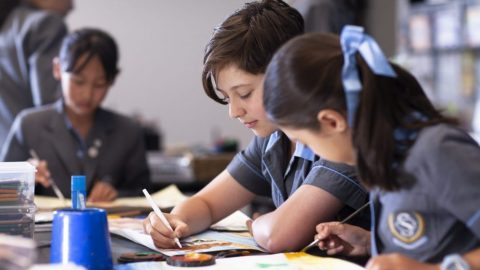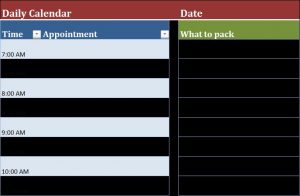Organisational and Time Management Skills

Being able to manage themselves and their time are two skills that we need to help children develop, as they are skills we all use every day and they can have an impact on our quality of life. As a busy working mother, I found that I was well organised, however, I also noted that while I had good skills, my children did not. I found myself stretching the multi-tasking concept too far! I was doing more for them so that our home and lives ran a little smoother. I realised I was improving my skills and could do 99 things at a time (a slight exaggeration!) while they were not improving at all. I was running myself into the ground and getting frustrated that they were not doing more. It was time to stop.
I thought of the insanity quote: “Insanity is doing the same thing over and over again and expecting different results.” I came to the conclusion that I needed to teach my children the skills I used as they were not going to develop them on their own.
Does your daughter:
- Leave things at home, school, or her grandparents’ house?
- Not know how to pack her own bag?
- Not know what to pack in her school bag?
- Leave everything to the last minute and then need help?
- Arrive late to breakfast, the car or school?
- Lose track of time?
- Have a messy room?
- Lose things?
If so, you might need to help her develop some skills in organisation and time management.
Big Picture First
Sit down with your daughter and work out a timetable of her activities and school day. You can use a blank diary page as shown below. Using her weekly school timetable, write her subjects, extracurricular activities and after school activities. Beside each activity, note what has to be packed – put in everything!

Getting Ready
From the activity above, develop:
- A weekly calendar and display it where she can see it easily and often – a pin board in her room is ideal.
- A packing list for each day. Help her remember everything – do not just write ‘sports bag’. Note everything in the bag – this will save you a trip to school!
Baby Steps
To begin with, start by watching her pack her bag, helping her check off each item as it is packed. Laminating the list and using a whiteboard marker to tick things off as they are added to the bag makes it fun and ensures every item is packed. The best time to do this is the night before. Once packed, the bag goes near the front door. The only thing to be added the next morning is her lunch box. Be prepared to amend the packing list as activities change.
Establish Routines
Packing the bag is one routine, the next is the afternoon routine. Going back to the weekly timetable, work out when homework, play and screen time is going to happen. I found the following worked best for my family:
- Once home, change out of her uniform and into casual clothes.
- Put her uniform in the laundry.
- Have afternoon tea.
- Do homework (I preferred to get homework done before dinner, as the later my children started, the more tired they became and the longer it took and the more mistakes they made).
- Pack bag from packing list.
- Get uniform ready for the next day.
- Play time (depending on age) but outside in fresh air is best.
- Dinner.
- Free time (TV, computer, games etc.)
- Set bed time and stick to it – change the time as they get older.
Break it Down
Break down big jobs into little jobs. Cleaning her room can be overwhelming for her as she may not know where or how to start. Join in and show her how you break it down. Remember, you are teaching her how you do it, so help her – you will be happier with the result. Eventually, she will be able to do it herself.
The main thing to remember is to match your expectations with her ability to carry out the task. My expectations of an 11-year-old girl would far exceed that of a Prep child.
I found this plan and routine worked for me and I hope it does for you too. Change it to suit your family as needed. A little work, planning and organising in the beginning set a solid foundation and helped my children develop their organisation and time management skills. They became much more independent as a result, and my mornings became trouble-free.
Good luck and please let me know if you try it. I would be happy to hold a Parent Information Session on this topic if parents are interested – just drop me a line.
Ms Karen McArdle, Head of Junior School
Year 6 Update
Students are encouraged to read every night to expand their vocabulary. As they grow older, they develop a preference for specific genres of books. In Year 6, students are recommended to read for at least 30 minutes a night. The Year 6 students have been writing book reports explaining why they would or would not recommend a book for a friend to read. Part of this book report has involved public speaking when sharing their summary and opinions of the book to their classmates. This has been great practice for their public speaking skills, as well as providing opportunities to introduce girls to different genres of books. We continue to encourage girls to challenge themselves by trying new genres of books, perhaps stepping outside their comfort zone, as they never know, they might just find something they like!



